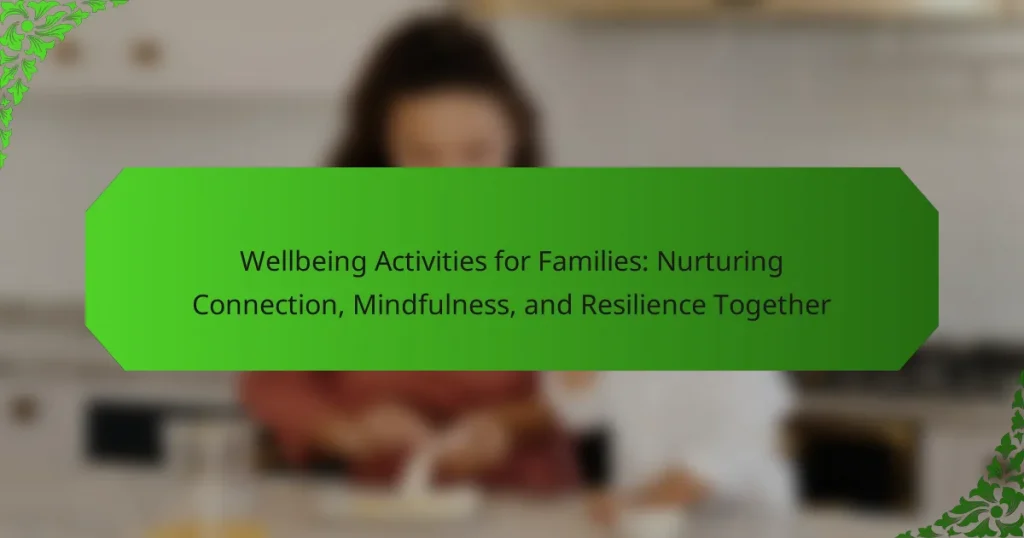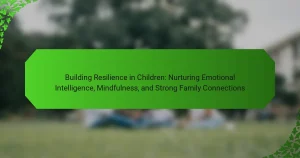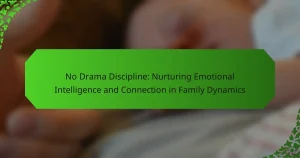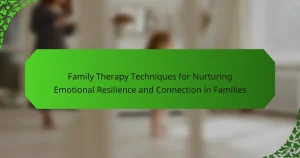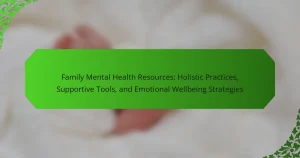Wellbeing activities for families enhance emotional bonding, reduce stress, and promote resilience. Engaging in shared experiences like nature walks, cooking, and mindfulness practices fosters connection. Unique activities such as family volunteering and creative workshops further strengthen relationships. Implementing these practices into daily routines can significantly improve family dynamics and overall mental health.
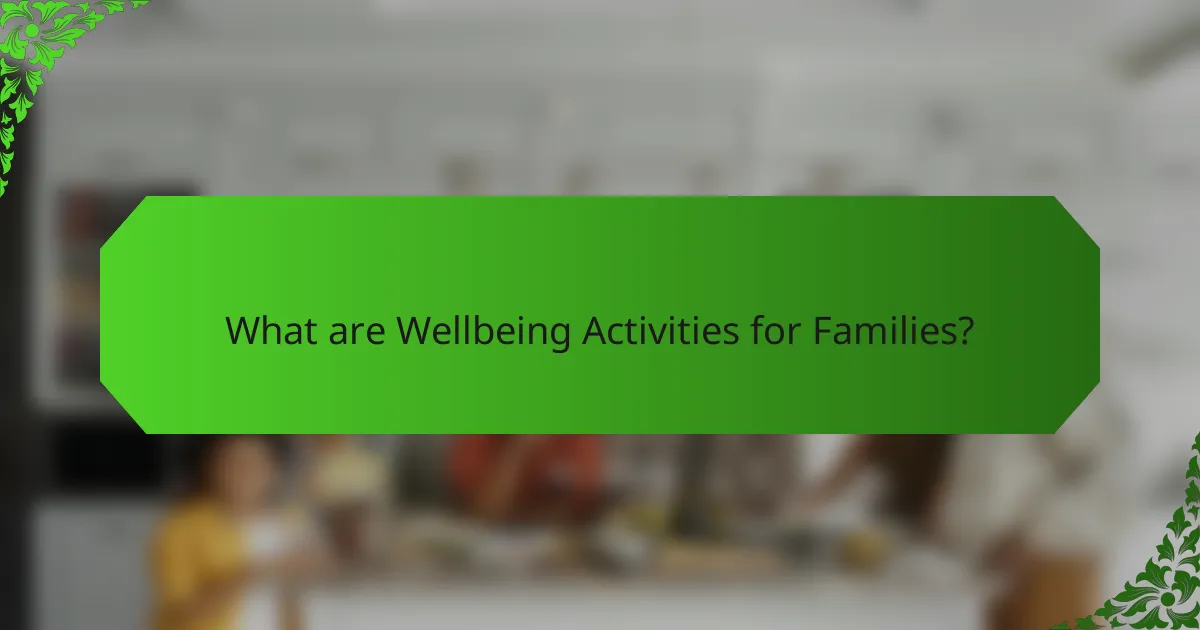
What are Wellbeing Activities for Families?
Wellbeing activities for families foster connection, mindfulness, and resilience. Engaging in shared experiences like outdoor adventures, cooking together, or practicing mindfulness exercises strengthens family bonds. Regular participation in these activities enhances emotional well-being and promotes a supportive family environment. Research shows that families who engage in wellbeing activities report higher levels of happiness and lower stress. Prioritising these practices can significantly improve family dynamics and overall mental health.
Why are Wellbeing Activities Important for Family Connection?
Wellbeing activities are essential for family connection as they foster communication, empathy, and shared experiences. Engaging in these activities enhances mindfulness and builds resilience within the family unit. Research indicates that families participating in wellbeing activities report stronger emotional bonds and improved mental health outcomes. For instance, regular family mindfulness practices can reduce stress and increase overall happiness, creating a nurturing environment for all members.
How Can Mindfulness Enhance Family Wellbeing?
Mindfulness can significantly enhance family wellbeing by fostering deeper connections and resilience. Engaging in mindfulness activities together nurtures communication, reduces stress, and promotes emotional awareness among family members. Research shows that families practicing mindfulness report improved relationships and increased emotional regulation. This shared experience cultivates a supportive environment, allowing families to navigate challenges more effectively. Integrating mindfulness into family routines can lead to lasting benefits in overall wellbeing.
What Role Does Resilience Play in Family Dynamics?
Resilience plays a crucial role in family dynamics by enhancing emotional strength and fostering healthy relationships. Families that cultivate resilience can better navigate challenges, communicate effectively, and support one another. This interconnectedness leads to improved mental wellbeing and stronger family bonds. Engaging in wellbeing activities together can further reinforce resilience, promoting mindfulness and connection among family members. By prioritising these practices, families create a nurturing environment that allows each member to thrive.
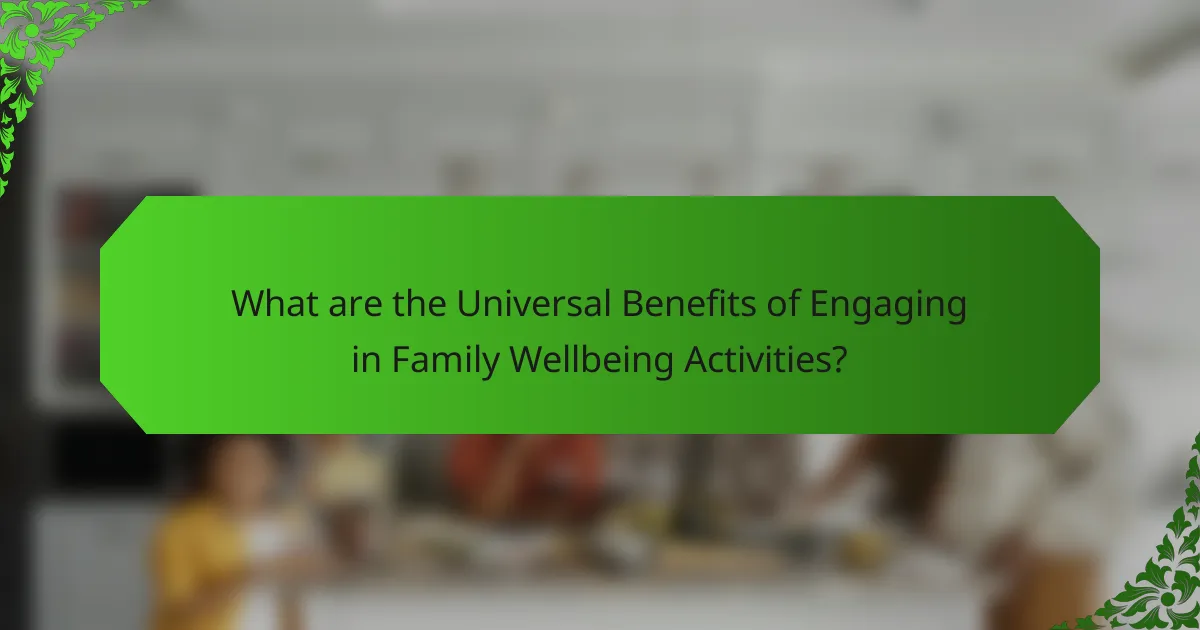
What are the Universal Benefits of Engaging in Family Wellbeing Activities?
Engaging in family wellbeing activities fosters stronger connections, enhances mindfulness, and builds resilience. These activities promote emotional bonding, reduce stress, and encourage open communication. Families participating together in mindfulness practices report improved mental health and increased life satisfaction. As a result, they develop coping strategies that benefit each member individually and collectively.
How Do These Activities Foster Stronger Relationships?
Engaging in wellbeing activities fosters stronger relationships by enhancing communication, building trust, and promoting shared experiences. These activities encourage families to spend quality time together, which strengthens emotional bonds. For instance, mindfulness practices can improve empathy, allowing family members to better understand each other’s feelings. Additionally, resilience-building exercises teach families to navigate challenges together, reinforcing their support systems. Overall, these activities create a nurturing environment that cultivates deeper connections among family members.
What Mental Health Improvements Can Families Experience?
Families can experience improved mental health through wellbeing activities that foster connection, mindfulness, and resilience. Engaging in shared activities enhances emotional support, reduces stress, and strengthens relationships. Research indicates that families practicing mindfulness together report lower anxiety levels and increased overall happiness. Regular participation in these activities can lead to lasting improvements in mental well-being and family dynamics.
How Do Wellbeing Activities Promote Positive Communication?
Wellbeing activities enhance positive communication by fostering emotional connection and active listening. Engaging in shared experiences, such as mindfulness exercises or family games, cultivates an environment of trust. This encourages open dialogue and expression of feelings, which strengthens relationships. Research shows that families who practice wellbeing activities report improved communication and conflict resolution skills. Regular participation in these activities can lead to lasting resilience and understanding among family members.
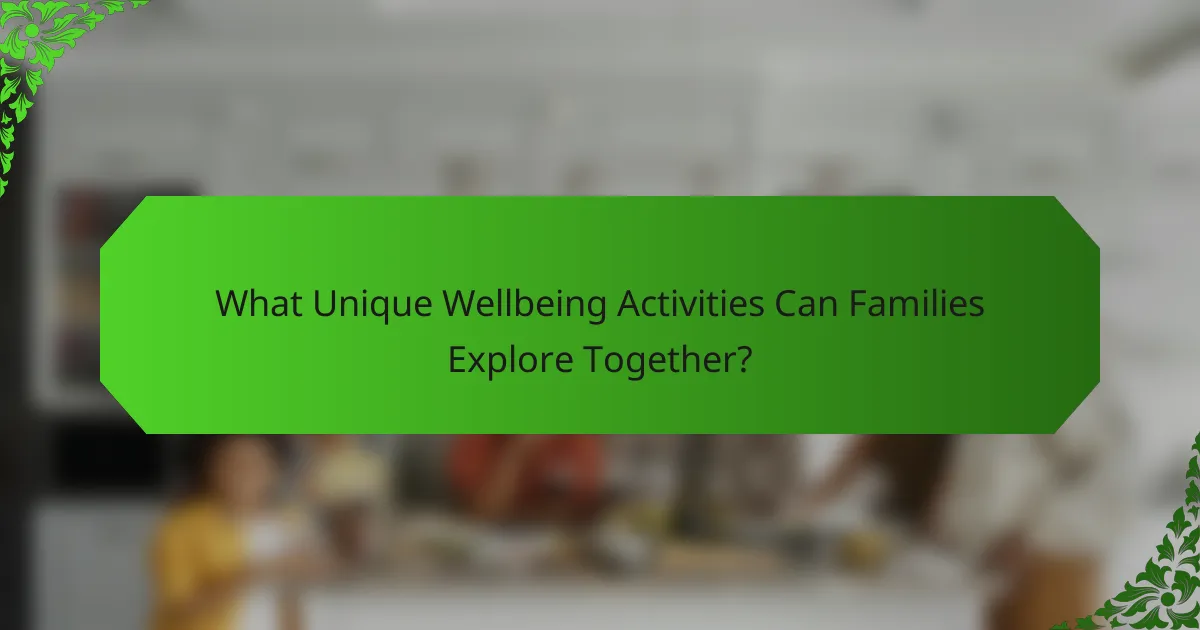
What Unique Wellbeing Activities Can Families Explore Together?
Families can explore unique wellbeing activities such as nature walks, mindfulness meditation, cooking classes, and art projects. These activities promote connection, mindfulness, and resilience. Nature walks encourage physical activity and appreciation for the environment. Mindfulness meditation fosters emotional regulation and stress relief. Cooking classes enhance collaboration and healthy eating habits. Art projects stimulate creativity and self-expression. Engaging in these activities together strengthens family bonds while nurturing individual wellbeing.
What Creative Arts and Crafts Activities Enhance Family Bonding?
Creative arts and crafts activities significantly enhance family bonding by promoting collaboration and communication. Engaging in projects like painting, pottery, or scrapbooking fosters creativity and mindfulness. These activities encourage families to share ideas, express emotions, and create lasting memories together. Research shows that families participating in creative projects report improved relationships and resilience. Activities that involve teamwork, such as building a model or creating a family mural, uniquely strengthen connections and enhance problem-solving skills.
How Can Outdoor Adventures Contribute to Family Wellbeing?
Outdoor adventures significantly enhance family wellbeing by fostering connection, mindfulness, and resilience. Engaging in nature-based activities encourages families to bond, share experiences, and strengthen relationships.
Research indicates that spending time outdoors reduces stress and promotes mental health. Families participating in outdoor activities report increased feelings of happiness and improved communication.
Mindfulness is cultivated through nature immersion, allowing families to practice being present and appreciating their surroundings. Activities like hiking or camping encourage reflection and stress reduction.
Resilience develops as families face challenges together in outdoor settings. Overcoming obstacles during adventures builds teamwork and problem-solving skills, essential for navigating life’s difficulties.
What Unique Mindfulness Practices Are Suitable for Families?
Mindfulness practices suitable for families include activities that foster connection and resilience. Family yoga encourages physical bonding and relaxation. Guided meditation sessions can enhance emotional understanding and communication. Nature walks promote mindfulness through observation and appreciation of the environment. Art therapy allows creative expression and stress relief. Cooking together cultivates teamwork and mindfulness in daily tasks. Each practice nurtures family relationships while promoting individual well-being.
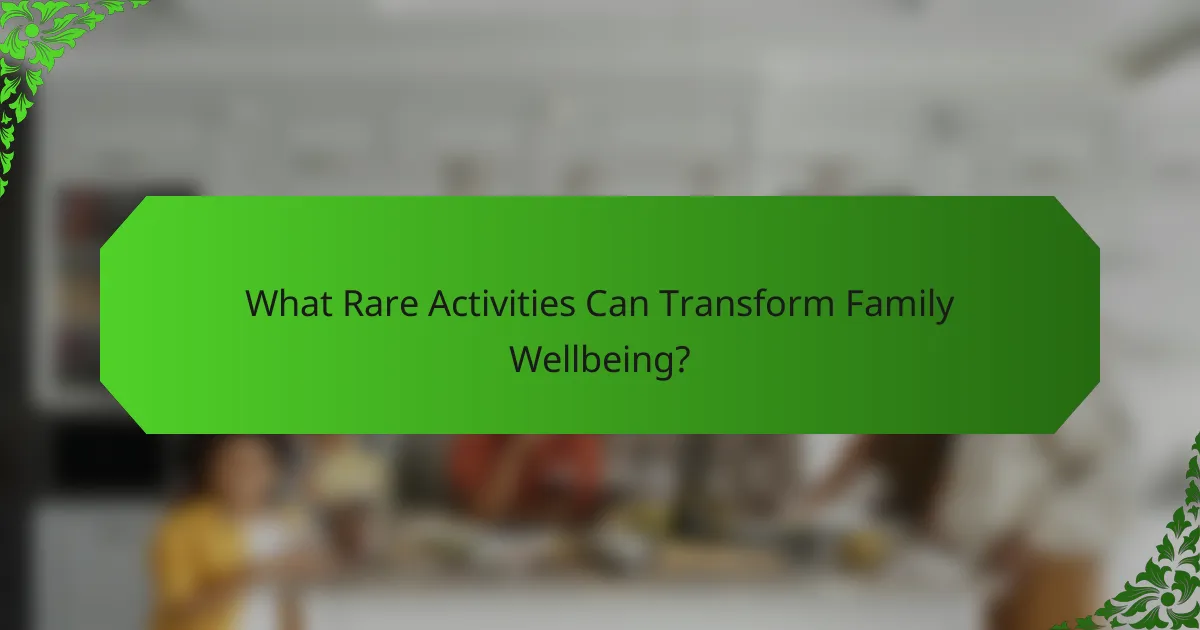
What Rare Activities Can Transform Family Wellbeing?
Engaging in rare activities can significantly enhance family wellbeing by fostering deeper connections and resilience. Unique experiences, such as family volunteering, outdoor adventure challenges, or creative workshops, encourage teamwork and mindfulness. These activities promote emotional bonding and shared memories, essential for nurturing a supportive family environment. Families that explore unconventional hobbies together often report improved communication and emotional health.
How Can Family Volunteering Impact Mental Health?
Family volunteering significantly enhances mental health by fostering connection, promoting mindfulness, and building resilience. Engaging in shared activities reduces stress and increases feelings of belonging. Research shows that families who volunteer together report improved emotional well-being and stronger relationships. This unique attribute of family volunteering creates lasting positive impacts on individual and collective mental health.
What Are the Benefits of Family Retreats Focused on Wellbeing?
Family retreats focused on wellbeing enhance connection, mindfulness, and resilience. These retreats foster stronger family bonds, reduce stress, and promote emotional health. Engaging in shared activities cultivates empathy and understanding among family members. Additionally, mindfulness practices during retreats improve focus and emotional regulation. Research indicates that families participating in wellbeing activities report higher satisfaction and cohesion.
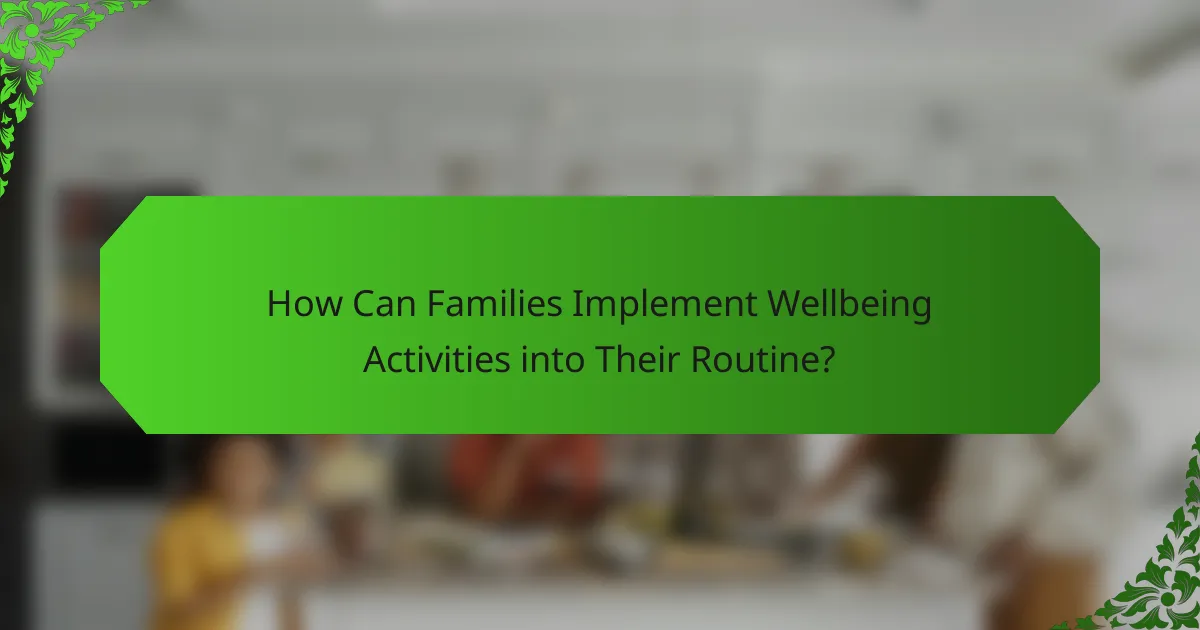
How Can Families Implement Wellbeing Activities into Their Routine?
Families can implement wellbeing activities into their routine by prioritising connection, mindfulness, and resilience. Regular family meetings foster open communication, while shared mindfulness practices, such as meditation or yoga, enhance emotional awareness. Outdoor activities, like hiking or gardening, promote physical health and bonding. Establishing a gratitude practice, where family members share what they appreciate, builds resilience and positivity. Lastly, creative projects, such as art or cooking together, encourage collaboration and strengthen relationships.
What Strategies Help Families Prioritise Wellbeing Activities?
To prioritise wellbeing activities, families should establish a routine, engage in open communication, and set shared goals. Creating a weekly schedule dedicated to mindfulness practices, outdoor activities, and family discussions fosters connection. Incorporating these elements enhances resilience and nurtures relationships. Regularly evaluating the impact of these activities helps families adjust their approach for optimal wellbeing.
How Can Families Overcome Barriers to Engaging in Wellbeing Activities?
Families can overcome barriers to engaging in wellbeing activities by prioritising connection, mindfulness, and resilience. Establishing a routine fosters commitment, while open communication allows family members to express interests and concerns.
Scheduling regular family activities, such as nature walks or mindfulness exercises, can enhance participation. Additionally, creating a supportive environment encourages experimentation with different activities, helping to identify what resonates with each member.
Research indicates that families who engage in shared wellbeing practices report improved emotional health and stronger relationships. By addressing obstacles like time constraints or differing interests, families can cultivate a culture of wellbeing that nurtures connection and resilience.
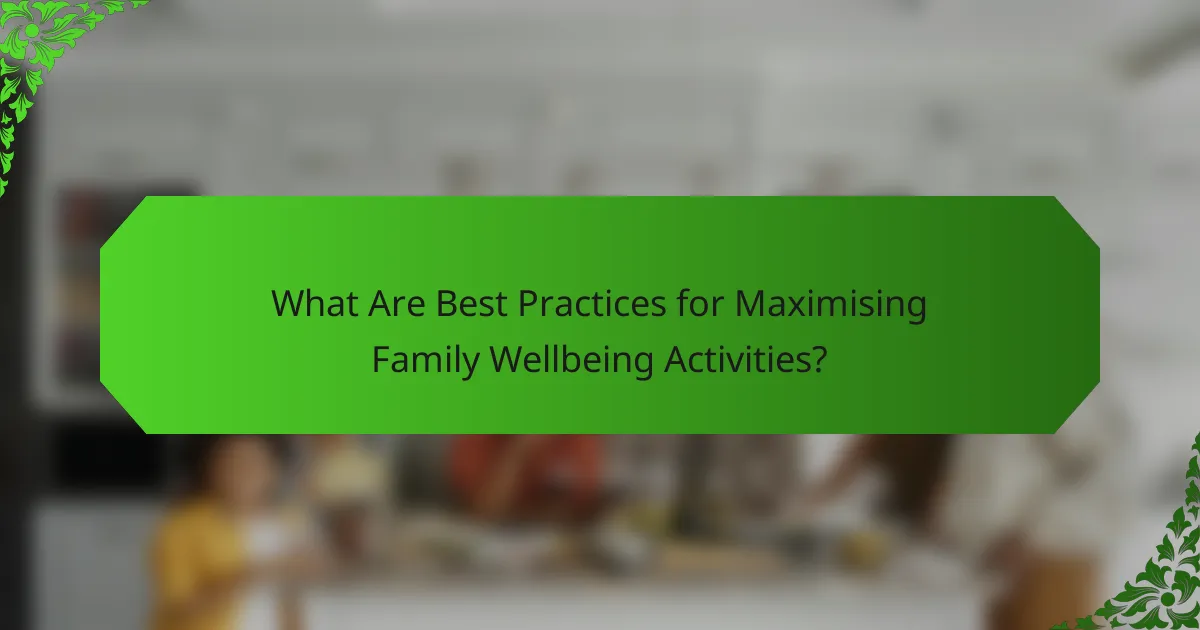
What Are Best Practices for Maximising Family Wellbeing Activities?
To maximise family wellbeing activities, prioritise connection, mindfulness, and resilience. Engage in regular family meetings to foster communication and understanding. Incorporate mindfulness practices such as meditation or nature walks, promoting emotional awareness. Schedule fun, collaborative activities that strengthen bonds and create lasting memories. Encourage open discussions about challenges to build resilience and problem-solving skills.
How Can Families Measure the Impact of Their Wellbeing Activities?
Families can measure the impact of their wellbeing activities through regular reflections and feedback sessions. Tracking emotional changes, engagement levels, and family dynamics can provide insights into the effectiveness of these activities.
Establishing a baseline before starting wellbeing activities is crucial. This allows families to compare progress over time. Surveys or journals can help document feelings and experiences, offering a clear picture of improvement.
Incorporating specific metrics, such as participation rates and satisfaction scores, can quantify the impact. For example, families can rate their enjoyment of activities on a scale of 1 to 10, facilitating objective evaluation.
Lastly, fostering open communication encourages family members to express their thoughts on the activities. This dialogue can uncover valuable insights and guide future wellbeing initiatives, ensuring they remain relevant and beneficial.
What Common Mistakes Should Families Avoid When Engaging in Wellbeing Activities?
Families should avoid common mistakes like lack of planning, unrealistic expectations, and neglecting individual preferences. Engaging in wellbeing activities requires thoughtful organization and consideration of all family members’ needs. Prioritise activities that foster connection without overwhelming participants. Be flexible and open to adapting plans based on family dynamics.
What Expert Tips Can Enhance Family Wellbeing Initiatives?
Engaging in wellbeing activities enhances family connection, mindfulness, and resilience. Prioritise open communication, schedule regular family time, and incorporate mindfulness practices. Encourage physical activities together, such as hiking or biking, to foster teamwork and health. Explore creative outlets like art projects to stimulate emotional expression. Implement gratitude practices to strengthen family bonds and improve overall wellbeing.
